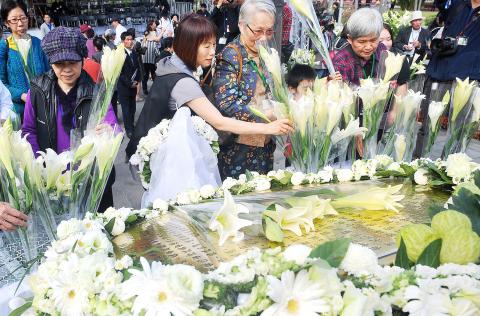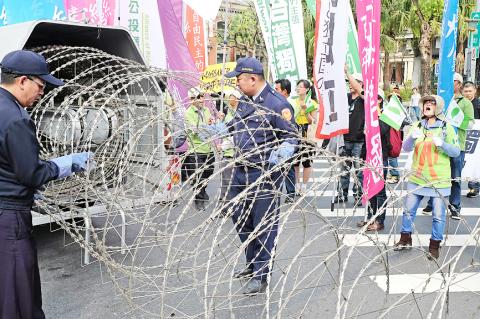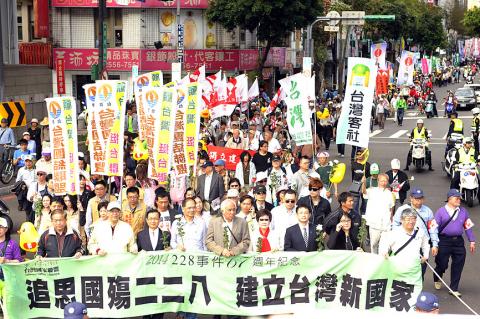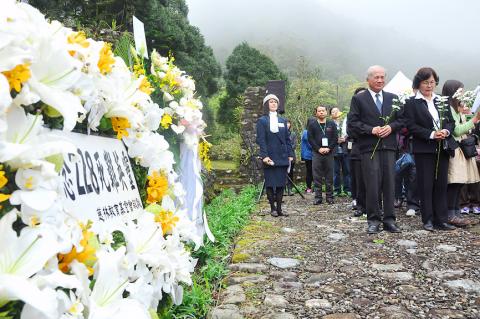The truth behind the 228 Massacre remains incomplete after 67 years and only when the whole truth is revealed can there be a guarantee that the tragedy will not happen again, victims, their families and activists said yesterday as they commemorated the anniversary of the 228 Incident.
After the nation’s democratization in the 1990s, it was no longer taboo to talk about the massacre, a watershed incident in Taiwan’s history, which resulted in the deaths of tens of thousands of civilians — many of them intellectuals, politicians and the social elite — and created a climate of fear that left many Taiwanese reluctant to get involved in politics.
The incident that sparked the suppression of anti-government uprisings occurred on Feb. 27, 1947, but the bloody crackdown by forces of the then-Chinese Nationalist Party (KMT) regime began the following day.

Photo: Liao Chen-huei, Taipei Times
The complete archive of documents related to the massacre has yet to be disclosed, and academics and politicians still debate the course of the massacre, activists and representatives of the victims’ families said yesterday.
President Ma Ying-jeou’s (馬英九) administration, in particular, has been trying to distort history, describing the event as “people rebelling against misgovernment” and insisting that the money paid to the victims and their families was compensation rather than indemnity, they told hundreds of people attending a rally in Taipei.
The participants, mostly senior citizens, assembled yesterday afternoon in front of the Pegasus Teahouse (天馬茶房) on Nanjing W Road, where the Feb. 27 incident between a cigarette vendor and Tobacco Monopoly Bureau agents that led to the massacre occurred.

Photo: Sam Yeh, AFP
After a brief ceremony that began at 2:28pm, a march was held to the 228 Memorial Park and Liberty Square in front of the Chiang Kai-Shek Memorial.
“It takes more than repeated apologies from President Ma to put the massacre behind us. One of the biggest problems of the 228 Massacre, I would say, is that the government has never really tackled the issue head-on,” Taiwan 228 Care Association chairman Chen Yi-shen (陳儀深) said.
No individual who was involved in the massacre has been held responsible, Chen said.

Photo: Chen Chih-chu, Taipei Times
Activisits and victims’ families said they were hurt by the recent comment of Taipei mayoral aspirant Ko Wen-je (柯文哲), whose grandfather was a 228 victim, that identifying the prime culprit of the massacre is “unnecessary” and “looking to the future and forgetting the past” is more important.
Ko reiterated his views yesterday, saying that people should have a sense of “mercy” so that the painful memory could fade away.
Democratic Progressive Party (DPP) politicians attending the commemoration said they disagreed with Ko, with Chairman Su Tseng-chang (蘇貞昌) saying that “truth should come before forgiveness” and former vice president Annette Lu (呂秀蓮) saying that the historical chapter could not be closed easily because “misfortune would be repeated if we were not careful.”

Photo: CNA
Meanwhile, former DPP chairman Lin Yi-xiong (林義雄) paid tribute to a more personal incident at a church service yesterday morning, remembering his mother and young twin daughters who were murdered at his home on Feb. 28, 1980.
The unsolved murders occurred when Lin was in jail due to his role in the 1979 Kaohsiung Incident.
Lin yesterday confirmed he would take part in the establishment of a new political party, tentatively named the “Civil Assembly (公民組合),” saying that the party aims to be a progressive force.

CHAOS: Iranians took to the streets playing celebratory music after reports of Khamenei’s death on Saturday, while mourners also gathered in Tehran yesterday Iranian Supreme Leader Ayatollah Ali Khamenei was killed in a major attack on Iran launched by Israel and the US, throwing the future of the Islamic republic into doubt and raising the risk of regional instability. Iranian state television and the state-run IRNA news agency announced the 86-year-old’s death early yesterday. US President Donald Trump said it gave Iranians their “greatest chance” to “take back” their country. The announcements came after a joint US and Israeli aerial bombardment that targeted Iranian military and governmental sites. Trump said the “heavy and pinpoint bombing” would continue through the week or as long

TRUST: The KMT said it respected the US’ timing and considerations, and hoped it would continue to honor its commitments to helping Taiwan bolster its defenses and deterrence US President Donald Trump is delaying a multibillion-dollar arms sale to Taiwan to ensure his visit to Beijing is successful, a New York Times report said. The weapons sales package has stalled in the US Department of State, the report said, citing US officials it did not identify. The White House has told agencies not to push forward ahead of Trump’s meeting with Chinese President Xi Jinping (習近平), it said. The two last month held a phone call to discuss trade and geopolitical flashpoints ahead of the summit. Xi raised the Taiwan issue and urged the US to handle arms sales to

State-run CPC Corp, Taiwan (CPC, 台灣中油) yesterday said that it had confirmed on Saturday night with its liquefied natural gas (LNG) and crude oil suppliers that shipments are proceeding as scheduled and that domestic supplies remain unaffected. The CPC yesterday announced the gasoline and diesel prices will rise by NT$0.2 and NT$0.4 per liter, respectively, starting Monday, citing Middle East tensions and blizzards in the eastern United States. CPC also iterated it has been reducing the proportion of crude oil imports from the Middle East and diversifying its supply sources in the past few years in response to geopolitical risks, expanding

An Emirates flight from Dubai arrived at Taiwan Taoyuan International Airport yesterday afternoon, the first service of the airline since the US and Israel launched strikes against Iran on Saturday. Flight EK366 took off from the United Arab Emirates (UAE) at 3:51am yesterday and landed at 4:02pm before taxiing to the airport’s D6 gate at Terminal 2 at 4:08pm, data from the airport and FlightAware, a global flight tracking site, showed. Of the 501 passengers on the flight, 275 were Taiwanese, including 96 group tour travelers, the data showed. Tourism Administration Deputy Director-General Huang He-ting (黃荷婷) greeted Taiwanese passengers at the airport and